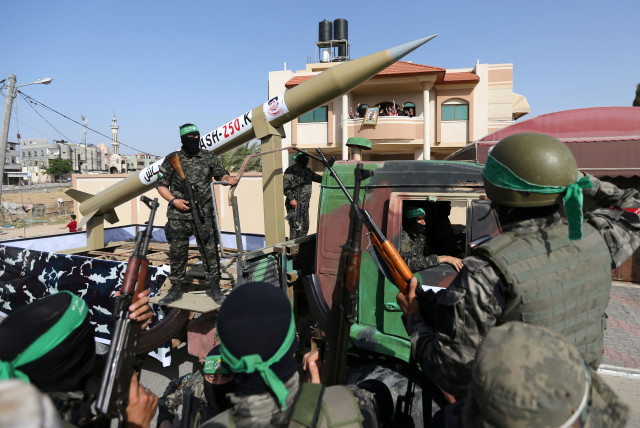Innocence during wartime is a nuanced issue - opinion

Not every civilian in society can be neatly categorized as innocent, and it’s well beyond time that we acknowledge this nuance.
After October 7, there has been a major uptick in antisemitism. In our frightening reality, many of the individuals who are calling for a ceasefire are doing so without understanding the full context of what happened that dark Saturday and well before that.
In our common society, we often gravitate towards the comforting argument of innocence versus guilt. We cling to the belief that civilians are inherently innocent, their actions guided by virtue and righteousness. However, the reality is far more complex. Not every civilian in society can be neatly categorized as innocent, and it’s well beyond time that we acknowledge this nuance.
When it comes to what is happening in Gaza, the common trope that people use to describe Gazans is that they are “innocent civilians” in “the world’s largest open-air prison.” However, what happened on October 7 ensures we must change that narrative. Plus, the reason why Israel has a border wall with Gaza, along with a security barrier along the West Bank, is for security reasons and also to prevent terrorism. Both have done so by more than 90% over the course of nearly two decades.
The premeditated crimes of October 7 include homicide, abduction, and rape. How come these are not being characterized as war crimes? It’s because it includes Jews. As the saying goes: “No Jews, No News.”
America would be doing much more if this happened on United States soil.
It’s essential to preface this discussion with the acknowledgment that most civilians are law-abiding citizens who contribute positively to their communities. However, to ignore the existence of individuals who engage in illicit activities or harbor harmful intentions is to turn a blind eye to a significant aspect of societal dynamics.
Crime and wrongdoing are not confined to the realm of “criminals” alone. They can permeate through any stratum of society, regardless of age, gender, race, or socioeconomic status. The notion of innocence should not serve as a shield to absolve individuals from accountability for their actions. Whether it’s indoctrination, domestic abuse, or systemic oppression, the perpetrators often operate within the guise of civilian innocence.
In all forms of major monotheistic religious texts (the Torah, the [Christian] Bible, and the Quran), we are taught to love one another as our neighbor.
Moreover, the concept of innocence itself is fluid. What may seem innocuous or benign behavior to one individual could be perceived as harmful or criminal by another. Our perceptions are shaped by many factors, including cultural norms, personal biases, and societal constructs. Consequently, the line between innocence and guilt becomes blurred, if not entirely arbitrary.
Determining innocence is an uncomfortable challenge
To confront this complexity, we must foster a culture of critical thinking and empathy. Instead of resorting to simplistic labels, we should strive to understand the underlying motivations and circumstances that drive individuals to deviate from societal norms. This requires engaging in uncomfortable conversations, challenging ingrained assumptions, and confronting systemic injustices.
Those who hold power and privilege within society often benefit from the presumption of innocence, while marginalized groups are disproportionately subjected to scrutiny and suspicion. By acknowledging this disparity, we can work towards dismantling systems of oppression and fostering greater equity and justice.
It’s crucial to emphasize that acknowledging the complexity of innocence does not imply a dismissal of compassion or empathy. Everyone deserves to be treated with dignity and respect, regardless of their past actions or circumstances. However, true compassion requires a nuanced understanding of human behavior and a commitment to addressing the root causes of injustice.
In conclusion, the concept of innocence is far more intricate than what our moral, ethical, and historical understanding suggests. Just acknowledge Jews as people. That means eliminating the double standard of Jews, completely reminding yourself that Islamic jihadism exists, and acknowledging that murder, kidnapping, and rape are not resistance. By embracing nuance, fostering empathy, having tough conversations, and confronting systemic injustices, we can move towards a more just and equitable society for all.
The writer is an activist with a focus on the Jewish world and Israel. She is currently a Changemakers Fellow with the Jewish Federations of North America. You can follow her on Instagram @thezioprincess
Jerusalem Post Store
`; document.getElementById("linkPremium").innerHTML = cont; var divWithLink = document.getElementById("premium-link"); if (divWithLink !== null && divWithLink !== 'undefined') { divWithLink.style.border = "solid 1px #cb0f3e"; divWithLink.style.textAlign = "center"; divWithLink.style.marginBottom = "15px"; divWithLink.style.marginTop = "15px"; divWithLink.style.width = "100%"; divWithLink.style.backgroundColor = "#122952"; divWithLink.style.color = "#ffffff"; divWithLink.style.lineHeight = "1.5"; } } (function (v, i) { });

